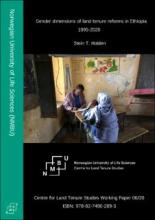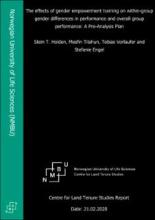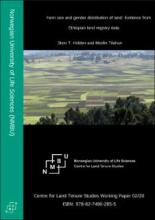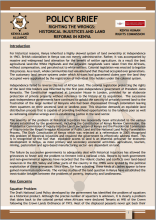/ library resources
Showing items 1 through 9 of 180.This chapter investigates how land tenure reforms in Ethiopia have influenced the position of women in terms of land tenure security, access to land, decision-power over land within households, as well as the gendered impacts of these tenure reforms on land investments, land productivity, land re
This report presents two papers developed in order to study behaviour in trust games in 18 Malawian villages in 2007.
This Pre-Analysis Plan is for a Randomized Control Trial (RCT) for recently formed youth business groups in Tigray Region of Ethiopia. Resource-poor rural youth are given a business opportunity by being allocated a rehabilitated land area where they can establish a joint business.
Land is an essential asset for the livelihood and welfare of rural households in agriculture-based rural economies.
This study investigates whether and to what extent rainfall shocks recurring in Sub-Saharan Africa, that have been associated with distress land rentals, enhance short-term and medium-term access to rented land by tenant households.
Negotiations are important in urban densification processes. In particular, integrative negotiations seem to be relevant. The conflicts between neighbors and developers can be challenging to solve.
For historical reasons, Kenya inherited a highly skewed system of land ownership at independence in 1963. British colonialism in Kenya was not merely administrative.
The Land Sector Non State Actors (LSNSA) is a network of civil society organizations working together to promote secure and equitable access to land and natural resource for all through advocacy, dialogue and capacity building.
Pagination
Land Library Search
Through our robust search engine, you can search for any item of the over 73,000 highly curated resources in the Land Library.
If you would like to find an overview of what is possible, feel free to peruse the Search Guide.








